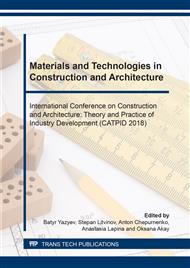p.681
p.687
p.692
p.699
p.705
p.711
p.717
p.722
p.727
The Style of the Neo-Greek (Neo-Grec) in the Historical and Cultural Context of the Southern Region of Russia by the Example of the Cities of Rostov-on-Don and Yessentuki
Abstract:
In European architecture the Neo-Grec style, based on a revival of Greek principles and motifs, is an independent stage in rediscovering of classical antique heritage. It is one of the “new styles” of a historicist phase in architecture that claimed to find national identity in the architecture of independent Greece. In Russian architecture of the mid-19th – early 20th centuries this style is represented in a wide range of monuments that are mostly located in the South of Russia. However insufficient knowledge and research on the monuments of this style create difficulties for their maintenance and restoration. The purpose of the paper is to identify distinctive features of neo-grec in the region. The main task is to determine the reasons for a turn to neo-grec in the South of Russia, to identify and analyze neo-grec buildings in the cities of Rostov-on-Don and Yessentuki, to examine their composition and décor, to identify their ancient prototypes, to differentiate constant and variable elements in the architecture of the Neo-Grec.
Info:
Periodical:
Pages:
705-710
DOI:
Citation:
Online since:
September 2018
Authors:
Price:
Сopyright:
© 2018 Trans Tech Publications Ltd. All Rights Reserved
Share:
Citation:


